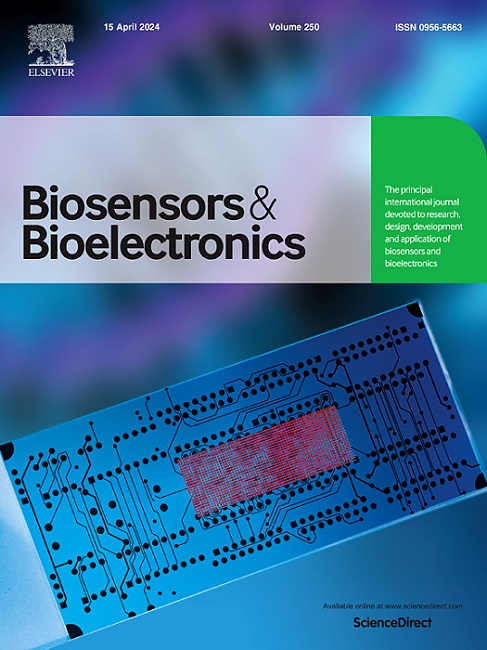Titanium nitride meta-biosensors targeting extracellular vesicles for high-sensitivity prostate cancer detection
IF 10.7
1区 生物学
Q1 BIOPHYSICS
引用次数: 0
Abstract
Disposable plasmonic metasurfaces with high biosensing performance are urgently sought for clinical label-free detection. Low-cost aluminum (Al) and titanium nitride (TiN) offer promising alternatives to noble metals for constructing these metasurfaces. However, Al suffers from limited chemical stability, and TiN exhibits weak plasmonic effects, both of which hinder their application in meta-biosensing. Here we integrate their complementary advantages and propose the TiN/Al meta-biosensors. They not only empower the unique near-field enhancement for sensing by TiN/Al hybrid plasmonic modes, but also construct a robust TiN armor against external wear, heat, moisture and corrosion during the bio-detection process. Compared to traditional gold-based counterparts, our meta-biosensors offer superior optical sensitivity at a much lower cost and with fewer pretreatment steps. The excellent biosensing performance facilitates the development of a high-throughput detection system for serum small extracellular vesicles (sEVs), aiding in the diagnosis and follow-up of prostate cancer. The sEVs meta-biosensing demonstrates a diagnostic sensitivity of 100% for significantly distinguishing early cancer, breaking through the conventional testing limitation. Moreover, it doubles the prediction accuracy of cancer recurrence risk following surgery. Our research highlights the potential for large-scale development of powerful meta-biosensors based on non-noble materials, opening up significant opportunities in cancer diagnosis and prognosis.
求助全文
约1分钟内获得全文
求助全文
来源期刊

Biosensors and Bioelectronics
工程技术-电化学
CiteScore
20.80
自引率
7.10%
发文量
1006
审稿时长
29 days
期刊介绍:
Biosensors & Bioelectronics, along with its open access companion journal Biosensors & Bioelectronics: X, is the leading international publication in the field of biosensors and bioelectronics. It covers research, design, development, and application of biosensors, which are analytical devices incorporating biological materials with physicochemical transducers. These devices, including sensors, DNA chips, electronic noses, and lab-on-a-chip, produce digital signals proportional to specific analytes. Examples include immunosensors and enzyme-based biosensors, applied in various fields such as medicine, environmental monitoring, and food industry. The journal also focuses on molecular and supramolecular structures for enhancing device performance.
 求助内容:
求助内容: 应助结果提醒方式:
应助结果提醒方式:


